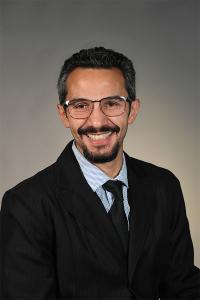Osama Al Dalahmah, MD, PhD

Overview
Academic Appointments
- Assistant Professor in Pathology and Cell Biology
Hospital Affiliations
- NewYork-Presbyterian / Columbia University Irving Medical Center
Gender
- Male
Schedule an Appointment
Connect Patient Portal
For existing patients, login to make an appointment, view documentation or contact your care provider.
Research
My laboratory is focused on understanding glial pathology in central nervous system (CNS) diseases. Astrocytes are amongst the most abundant cells in the CNS and play vital roles in maintaining homeostasis in the brain microenvironment. The ultimate mission of the laboratory is to understand the heterogeneity of astrocytes in different regions of the CNS, define how astrocytes respond to various types of injury, and discover novel astrocyte-centered approaches to treat neurodegenerative diseases (NDs) and brain tumors. We use single cell RNA sequencing and spatial transcriptomics to define the transcriptional programs which inform the development and testing of therapeutic targets.
One of the main areas of research in the laboratory is neurodegeneration. Diseases such as Huntington’s disease (HD), Parkinson’s disease (PD), Frontotemporal dementia (FTD), and Alzheimer’s disease (AD), result in neuronal loss and astrocytes dysfunction. Ultimately, we aim to define how astrocytes become dysfunctional in different diseases and leverage this knowledge to modify the course of disease progression in models of neurodegeneration in vivo and in vitro, which is a key step to translating this knowledge into clinical tools.
A central focus of research in the laboratory is glioma biology. Glioblastoma is a brain malignancy that defies current treatment modalities. Glioma cells diffusely infiltrate the brain and elude surgical resection. At the resection margins of glioma, the tumor cells interact with non-neoplastic cells of the brain microenvironment, including astrocytes, which may contribute to disease progression. Using single nucleus RNA sequencing, we identified different states of astrocyte gene expression, some may promote tumor progression. Ongoing projects leverage this knowledge to block tumor progression and test therapeutic targets.
Selected Publications
- Soares LC, Al-Dalahmah O, Hillis J, Young CC, Asbed I, Sakaguchi M, O'Neill E, Szele FG. Novel Galectin-3 Roles in Neurogenesis, Inflammation and Neurological Diseases. Cells. 2021 Nov 5;10(11):3047. doi: 10.3390/cells10113047.PMID: 34831271 Review.
- Al-Dalahmah O, Sosunov AA, Shaik A, Ofori K, Liu Y, Vonsattel JP, Adorjan I, Menon V, Goldman JE. Single-nucleus RNA-seq identifies Huntington disease astrocyte states. Acta Neuropathol Commun. 2020 Feb 18;8(1):19. doi: 10.1186/s40478-020-0880-6.PMID: 32070434 Free PMC article.
- Al-Dalahmah O, Nicholson J, Draijer S, Soares LC, Szele FG. Galectin-3 diminishes Wnt signaling in the postnatal subventricular zone. Stem Cells. 2020 Sep;38(9):1149-1158. doi: 10.1002/stem.3202. Epub 2020 Jun 8.PMID: 32442340
- Al-Dalahmah O, Campos Soares L, Nicholson J, Draijer S, Mundim M, Lu VM, Sun B, Tyler T, Adorján I, O'Neill E, Szele FG. Galectin-3 modulates postnatal subventricular zone gliogenesis. Glia. 2020 Feb;68(2):435-450. doi: 10.1002/glia.23730. Epub 2019 Oct 18.PMID: 31626379
- Bardella C, Al-Dalahmah O, Krell D, Brazauskas P, Al-Qahtani K, Tomkova M, Adam J, Serres S, Lockstone H, Freeman-Mills L, Pfeffer I, Sibson N, Goldin R, Schuster-Böeckler B, Pollard PJ, Soga T, McCullagh JS, Schofield CJ, Mulholland P, Ansorge O, Kriaucionis S, Ratcliffe PJ, Szele FG, Tomlinson I. Expression of Idh1R132H in the Murine Subventricular Zone Stem Cell Niche Recapitulates Features of Early Gliomagenesis. Cancer Cell. 2016 Oct 10;30(4):578-594. doi: 10.1016/j.ccell.2016.08.017. Epub 2016 Sep 29